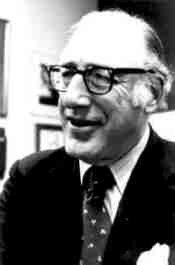 Fred W.
Friendly Fred W.
Friendlyradio and
television news producer
Ferdinand Friendly Wachenheimer
was born in New York City, on October 30, 1915. A
graduate of Nichols Business College, he entered
radio in the 1930's at a radio station in
Providence, Rhode Island (which is where he
changed his name). By the 1940's he was an
experienced radio producer.
It was as a radio producer that
Friendly first worked with Edward R. Murrow, on
the Columbia Records historical albums series I
Can Hear It Now. The first entry in the
series, released on Thanksgiving Day 1948,
covered the years 1933 to 1945, and featured
actual clips of radio news coverage and speeches
of the major events during that period.
Friendly's next full-time job
was as news producer at NBC Radio. It was there
that he came up with the idea for the
news-oriented quiz show Who Said That?,
hosted by NBC newsman Robert Trout. He also
wrote, directed and produced the summer 1950 NBC
Radio series The Quick and the Dead,
about the development of the atomic bomb.
After the success of The
Quick and the Dead, Friendly was recruited
to work for CBS Radio by news excecutive Sig
Mickelson. There Friendly re-teamed with Murrow
to produce a CBS Radio documentary series
inspired by their record albums -- a weekly show
called Hear It Now, hosted by Murrow.
The show moved to television as See It Now
on Sunday, November 18, 1951. On March 9, 1954,
Murrow and Friendly broadcast a See It Now
documentary analysis of Senator Joseph McCarthy
which has been credited with changing the public
view of McCarthy and being a key event in
McCarthy's fall from power. A previous episode
had probed the case of Air Force Reserve
Lieutenant Milo Radulovich, who had lost his
security clearance because of the supposed
leftist leanings of his sister and father. Five
weeks after that episode aired, Radulovich was
reinstated by the Secretary of the Air Force. See
It Now ended production in the summer of
1958.
From 1959 to 1964, Friendly was
executive producer of CBS Reports. One
of the most famous installments of CBS
Reports was a probe of migrant workers --
"Harvest of Shame" -- which aired in
November 1960. Other notable installments
included "Who Speaks for Birmingham?,"
"Birth Control and the Law," "The
Business of Heroin," and "The
Population Explosion."
Friendly became president of
CBS News in March 1964. He resigned abruptly on
February 15, 1966, when the network chose to
broadcast an "I Love Lucy" rerun while
rival NBC News went live with a Senate hearing on
Vietnam.
After leaving CBS, Friendly
became the Edward R. Murrow Professor of
Broadcast Journalism at Columbia University. He
also served as the Ford Foundation's adviser on
communications for fourteen years, created the
Columbia University Seminars on Media and Society
(now called the Fred Friendly Seminars), and
played a major role in establishing the PBS
network.
Over the course of his career,
Friendly was the recipient of 10 Peabody awards.
He was also the author of numerous articles and
five books, including The Good Guys,
the Bad Guys and The First Amendment (an account of a number of First
Amendment court cases) and Due to
Circumstances Beyond Our Control
(an account of his sixteen years at CBS).
Fred W. Friendly died on March
3, 1998.
Questions or comments about
this page?
|



